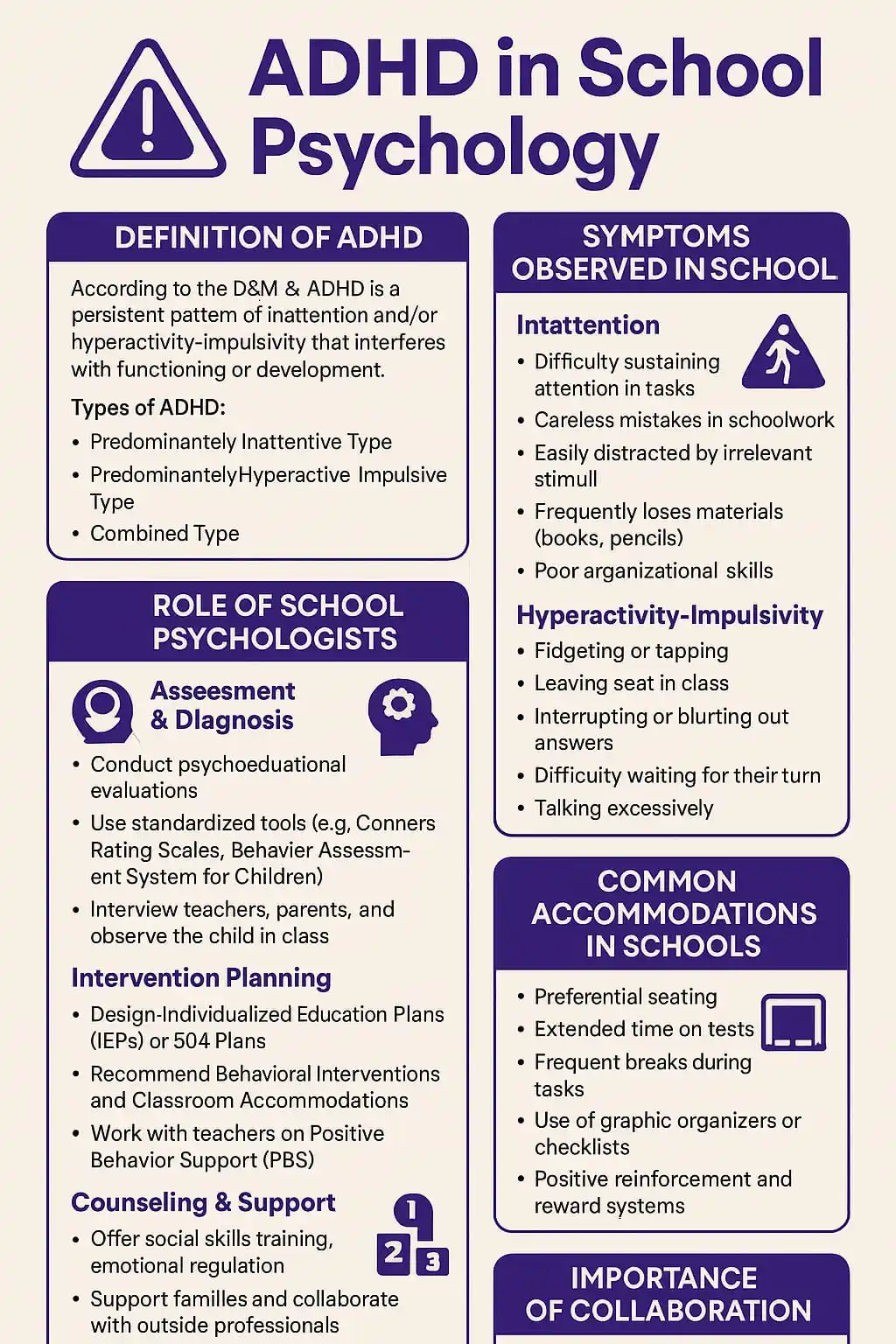
Psy.cheso
June 10, 2025 at 04:46 AM
**ADHD in School Psychology**
Attention-Deficit/Hyperactivity Disorder (ADHD) is one of the most common neurodevelopmental disorders diagnosed in school-aged children. In the context of school psychology, addressing ADHD is essential for academic success, behavioral adjustment, and social development. Below is a detailed summary of ADHD in school psychology:
1. Definition of ADHD
According to the DSM-5, ADHD is a persistent pattern of inattention and/or hyperactivity-impulsivity that interferes with functioning or development. Symptoms typically appear before age 12 and can persist into adulthood.
Types of ADHD:
Predominantly Inattentive Type
Predominantly Hyperactive-Impulsive Type
Combined Type
2. Symptoms Observed in School
Inattention:
Difficulty sustaining attention in tasks
Careless mistakes in schoolwork
Easily distracted by irrelevant stimuli
Frequently loses materials (books, pencils)
Poor organizational skills
Hyperactivity-Impulsivity:
Fidgeting or tapping
Leaving seat in class
Interrupting or blurting out answers
Difficulty waiting for their turn
Talking excessively
3. Role of School Psychologists
School psychologists play a critical role in supporting students with ADHD through:
a. Assessment & Diagnosis
Conduct psychoeducational evaluations
Use standardized tools (e.g., Conners Rating Scales, Behavior Assessment System for Children)
Interview teachers, parents, and observe the child in class
b. Intervention Planning
Design Individualized Education Plans (IEPs) or 504 Plans
Recommend Behavioral Interventions and Classroom Accommodations
Work with teachers on Positive Behavior Support (PBS)
c. Counseling & Support
Offer social skills training, emotional regulation strategies
Support families and collaborate with outside professionals
Address comorbid conditions (e.g., anxiety, learning disabilities)
4. Common Accommodations in Schools
Preferential seating
Extended time on tests
Frequent breaks during tasks
Use of graphic organizers or checklists
Positive reinforcement and reward systems
5. Multi-Tiered System of Supports (MTSS)
ADHD is often addressed within MTSS frameworks:
Tier 1: Universal supports for all students (e.g., structured classrooms)
Tier 2: Targeted small group interventions (e.g., behavior monitoring)
Tier 3: Intensive individualized supports (e.g., functional behavioral assessments)
6. Importance of Collaboration
Effective ADHD management in school settings involves:
Collaboration between teachers, school psychologists, parents, and if needed, medical professionals
Promoting consistency across home and school environments
7. Challenges and Ethical Considerations
Over-identification or misdiagnosis
Stigma and labeling
Ensuring cultural and linguistic fairness in assessments
Confidentiality and parental consent
8. Legal Frameworks
Individuals with Disabilities Education Act (IDEA): Offers special education services under "Other Health Impairment"
Section 504 of the Rehabilitation Act: Ensures accommodations for students with ADHD
**Conclusion**
ADHD in school settings requires a comprehensive, collaborative, and compassionate approach. School psychologists are pivotal in early identification, intervention, and advocacy to ensure students with ADHD reach their full academic and social potential.

❤️
👍
3